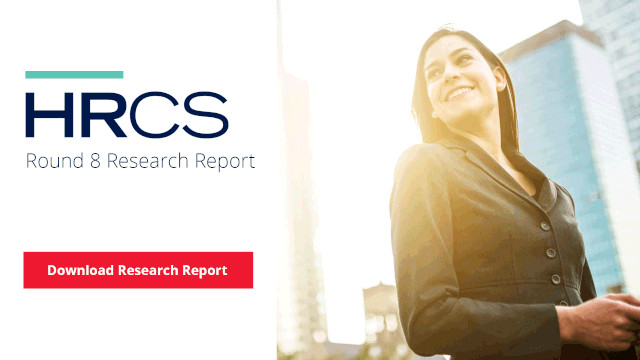Mobilizes Information: Exemplars to the Domain
Exemplars to the Domain is a series of articles highlighting senior HR executives who champion a specific competency from the latest HR Competency model. As you read about their experiences, we hope you will find parts that resonate with you individually, within your HR department, and that you can use to benefit your stakeholders.
Key Takeaways:
- Keeping a heightened level of focus in the areas that are strategically important to business goals will help define the data and insights that matter.
- HR was once driven by looking at past results and making decisions using instincts around experience, but with proper data leverage we can practically predict the future and make more informed decisions.
- By using data and insights that have real meaning for your organization you can directly affect business success.
- Watch full length interview with Christian Campanella and other Exemplars to the Domain.
Mobilizes Information: Exemplars to the Domain

Related Services
Related Insights
Christian Campanella is the HR, Communications & Sustainability Director at Pernod Ricard Winemakers. RBL Principal, Darryl Wee interviewed him about the importance of the Mobilizes Information domain.
Please share a little about your organizational context, and the role that you play for your organization.
Pernod Ricard Winemakers is part of the Global Pernod Ricard Group – the World’s Co-leader in the Wine and Spirits Industry with an unrivalled collection of brands, including Absolut® Vodka, Chivas Regal®, Jameson®, Jacob's Creek®, Brancott Estate®, and more.
Globally, Pernod Ricard employs over 18,000 people in more than 70 countries. Our success is the result of the passion and commitment of our people, our exceptional portfolio of leading premium brands, and a common bond: a commitment to our values of conviviality, entrepreneurship, integrity and commitment.
My role as the HR, Communications & Sustainability Director includes responsibilities that span across the entire Pernod Ricard Winemakers business in Australia, New Zealand, USA and Spain. I have a team of approximately 50 people located across 4 countries.
Why do you think this domain is relevant to HR and the work that you do?
Like all other functions within an organization, data and insights are playing more and more of a role in informing good decision making but also enabling us to model and predict future outcomes. There is massive opportunity within HR to not only use data to inform where we should be focused upon, but it also gives us the ability to quantify the impact more readily of what we do and how it drives business performance. In the past, HR has been driven by what we think is right or even by what we believe drives engagement (as indicated in engagement surveys). But to use people-data and link this to real business performance metrics will enable us to drive real tangible performance outcomes.
How have you or your team applied this domain to situations or initiatives in your organization? Please share 2 examples.
Over the past year we have implemented a culture survey within the organization measuring 11 culture qualities that we believe need to be thriving in our organization to drive performance and success. Using statistical analysis, we have compared this data against performance KPIs (e.g. sales performance) to determine whether there is either a direct relationship or a correlation against the individual culture qualities. This has allowed us to then focus our attention on either improving or maintaining individual culture qualities that have a direct impact on performance. Conversely, it has also allowed us to deprioritize other culture qualities that do not have an impact on performance.
An example closer to home is how we have used data to ensure that we are organized properly as a HR team with the right skills and capabilities to successfully deliver against our people strategy. By using a variety of measures such as the HRCS 360, Gartner HR Score, plus a range of other external measurements, we used the data and insights from this analysis to determine what we need to do as a function moving forward to be successful. This resulted in a change of the HR model we have within the organization along with strengthening key areas such as change management, data and insights and strategic workforce planning. It also allowed us to ensure we had a heightened level of focus in the areas that we believed are strategically important moving forward for the business in areas such as talent management, acquisition and developmental planning.
What were the benefits when applying this domain?
By using data and information to inform decision making it provides a platform for ensuring focus but also a way to justify why the decision has been made. It removes any bias and ensures that the decision is not made based on what someone thinks is right but rather what the data is telling you. However, it’s important to remember that insights do need to be interpreted and choices will need to be made, so it is not always black and white, but by using data and insights correctly it will hopefully mean the quality and impact of the decision is good.
What do you think are key factors that contributed to the successful application of this domain?
There are two key factors, mindset and capability. First, you need to instil a data mindset in the business, which values data and insights. You need to default to asking the question, “what is the data telling me?” when making a decision rather than just quickly using your gut instincts. It’s not to say that there is not a time or place for gut-based decision making, particularly when you are having to make decisions on the fly. However, when you do have data available and the time to factor it into your decision making you should try to make data-based decisions the default.
Second, capability is how to use data and draw insights is a skillset in its own right. HR has many lessons it can learn from functions such as Consumer Insights, which is all about how consumers think and feel about brands. At the end of the day, we are trying to do the same thing but with our employees and the business. Make sure you have the right skillsets in your team to enable this. It is very different to the HR analytics of the past which has typically been looking in the rear-view mirror of what has already happened (e.g. turnover). We want to be able to predict what might occur in the future.
What were some challenges faced when applying this at the workplace? How did you and your team overcome them?
The main challenge has been building the capability within the team to be able to do this at scale. This has led us to recruiting more people skilled in data and insights to build this scale and to start providing more opportunities to leverage data around everything we do as a function.
Are there any other thoughts or comments you would like to share that you think would be useful to those that read this article?
Mobilizing data is a journey that we are embarking upon where we will use data and insights to ultimately inform where we focus our time and energy as an organisation. To be a high performing organization we need to ensure understand what truly drives performance for our people and how do we enable an environment that allows people to perform at their best. We want to be less about looking at what has happened in the past but rather leverage that data to predict what may happen in the future. By better leveraging data and insights, I truly believe it will ensure that we, as a HR department, are focused on the right things that will ultimately drive business success.
Read other articles in the Exemplars of the Domain series: Accelerates Business, Advances Human Capability, and Simplifies Complexity & Fosters Collaboration.
If you are looking to strengthen HR competency on an individual, department, or business level, RBL is prepared to take that path with you. Contact us, to get started.






